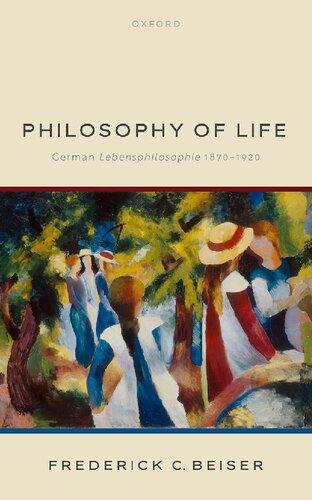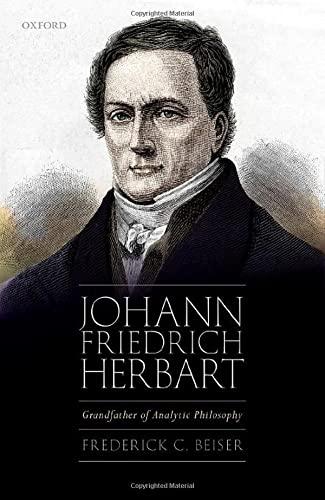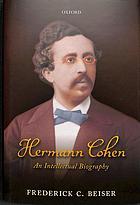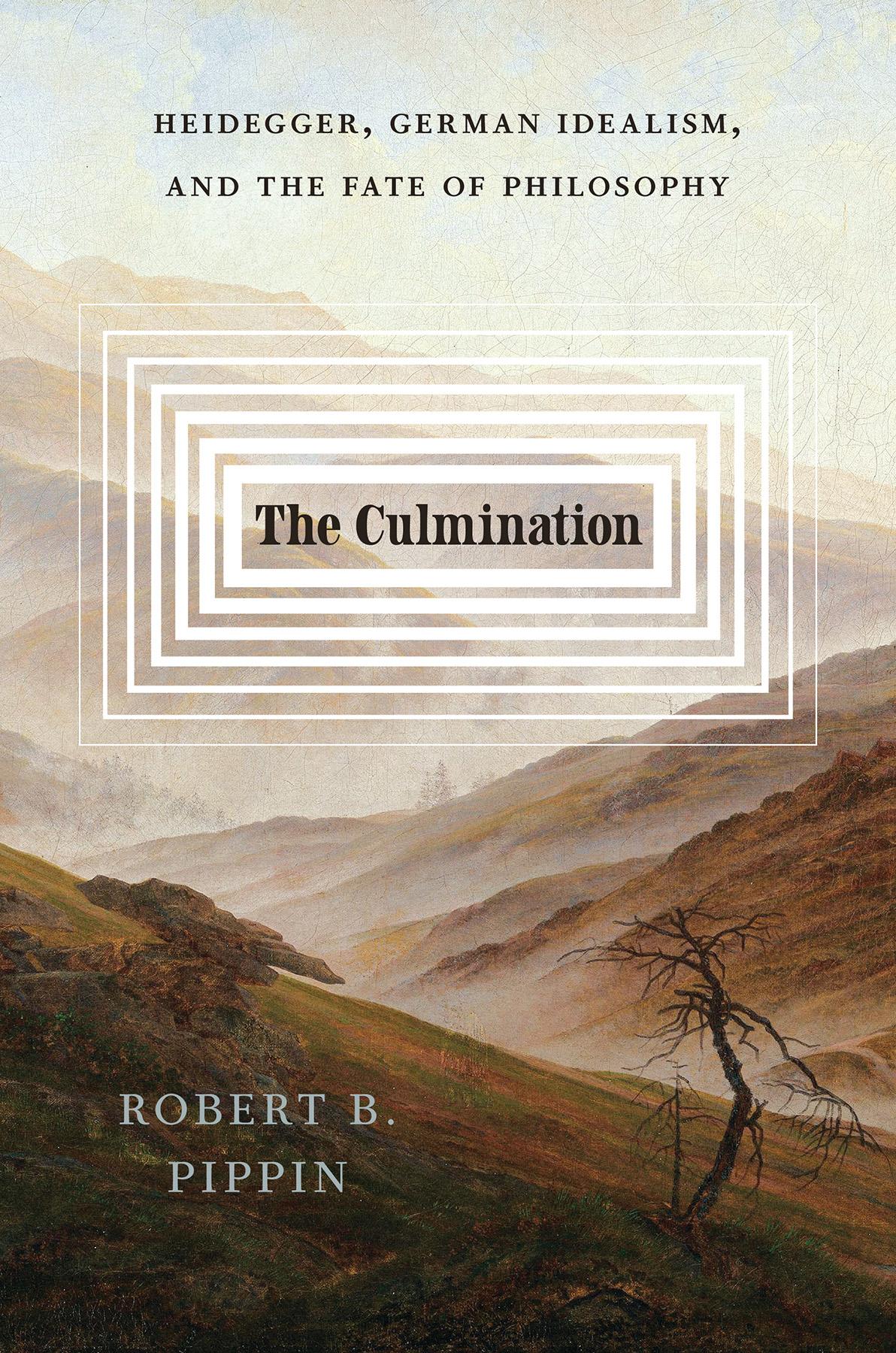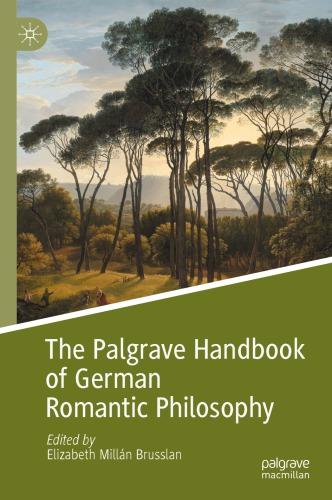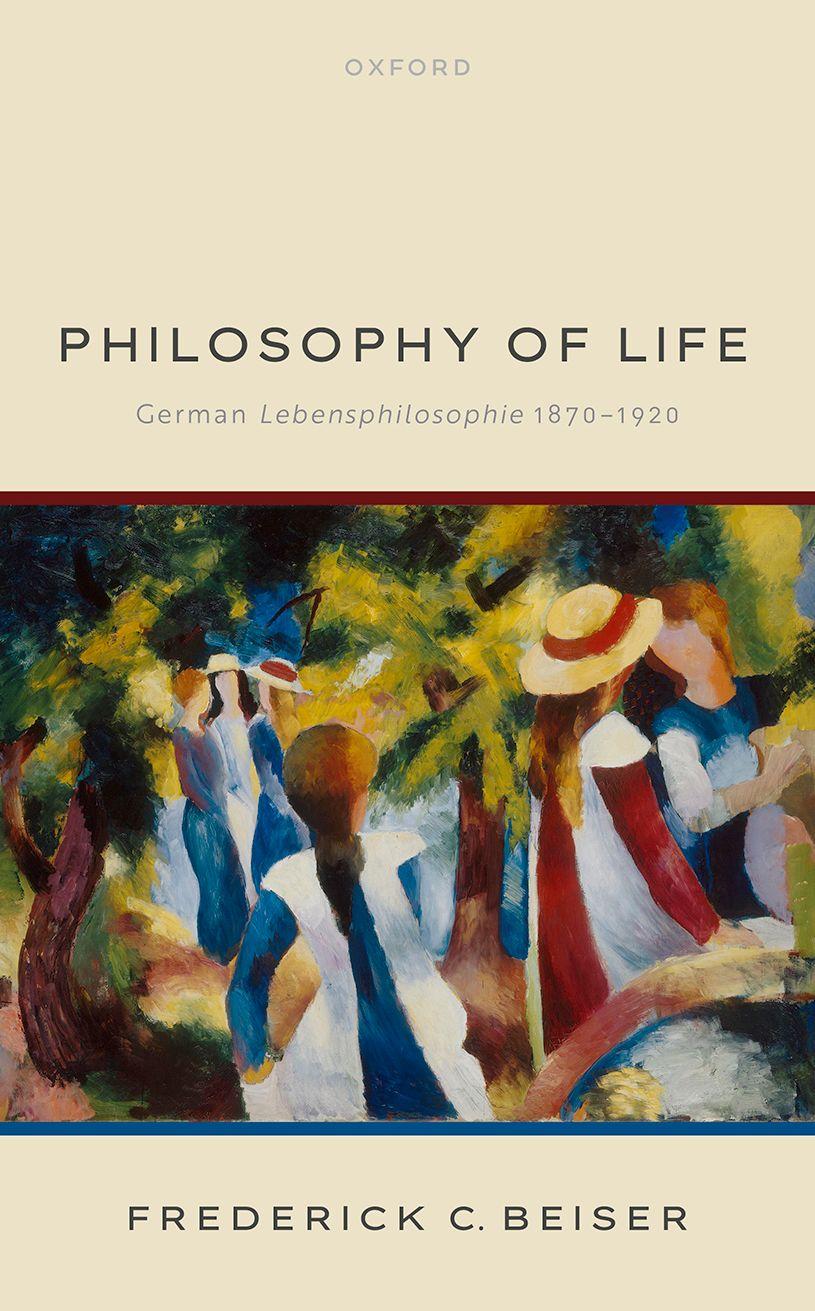PhilosophyofLife
German Lebensphilosophie 1870–1920
FREDERICKC.BEISER
GreatClarendonStreet,Oxford,OX26DP, UnitedKingdom
OxfordUniversityPressisadepartmentoftheUniversityofOxford. ItfurtherstheUniversity’sobjectiveofexcellenceinresearch,scholarship, andeducationbypublishingworldwide.Oxfordisaregisteredtrademarkof OxfordUniversityPressintheUKandincertainothercountries
©FrederickC.Beiser2023
Themoralrightsoftheauthorhavebeenasserted Allrightsreserved.Nopartofthispublicationmaybereproduced,storedin aretrievalsystem,ortransmitted,inanyformorbyanymeans,withoutthe priorpermissioninwritingofOxfordUniversityPress,orasexpresslypermitted bylaw,bylicenceorundertermsagreedwiththeappropriatereprographics rightsorganization.Enquiriesconcerningreproductionoutsidethescopeofthe aboveshouldbesenttotheRightsDepartment,OxfordUniversityPress,atthe addressabove
Youmustnotcirculatethisworkinanyotherform andyoumustimposethissameconditiononanyacquirer
PublishedintheUnitedStatesofAmericabyOxfordUniversityPress 198MadisonAvenue,NewYork,NY10016,UnitedStatesofAmerica
BritishLibraryCataloguinginPublicationData Dataavailable
LibraryofCongressControlNumber:2022949469
ISBN978–0–19–289976–7 DOI:10.1093/oso/9780192899767.001.0001
PrintedandboundintheUKby ClaysLtd,ElcografS.p.A.
LinkstothirdpartywebsitesareprovidedbyOxfordingoodfaithand forinformationonly.Oxforddisclaimsanyresponsibilityforthematerials containedinanythirdpartywebsitereferencedinthiswork.
Preface vii
Introduction1
1.DatesandDramatisPersonae1
2.HistoricalContext4
3.TheIdeaofLife5
4.TheValueofLife11
I.TheConceptionofPhilosophy15
1.PhilosophyasaWorldview15
2.Origins17
3.Nietzsche’sConceptionsofPhilosophy19
4.Dilthey’sIdeaofaWorldview23
5.Simmel’sQualification26
II.AnIndividualistEthics29
1.AnEthicsofProtest29
2.Nietzsche’sEarlyEthics31
3.Dilthey’sEthics38
4.Simmel’sIndividualLaw47
III.TheBattleagainstPessimism54
1.TheChallengeofPessimism54
2.Nietzsche’sFirstResponsetoPessimism57
3.DiltheyandPessimism61
4.SimmelonPessimism69
5.Nietzsche’sLaterResponsetoPessimism79
IV. Lebensphilosophie andHistoricism82
1.TheHistoricistTradition82
2. Lebensphilosophie andHermeneutics84
3.DiltheyandtheFoundationofHermeneutics86
4.SimmelandthePhilosophyofHistory97
5.Nietzsche’sHistoricism105
V.HistoricismandRelativism112
1.TheProblemofRelativism112
2.Nietzsche’sRelativism115
3.DiltheyandtheProblemofRelativism120
4.SimmelandtheConflictofValues127
VI.ReligiousLegacy134
1.ReligiousContext134
2.FaithandApostasyintheYoungNietzsche137
3.AModernEpicurus142
4.Dilthey’sReligiousBeliefs148
5.Simmel’sJewishBackground152
6.Simmel’sReligiousPhilosophy155
VII. Lebensphilosophie andIrrationalism162
1.TheChargeofIrrationalism162
2.TheMeaningof “Irrationalism” 163
3.ACritiqueofReason165
4.HermeneuticsandtheNewRationalism168 Conclusion171
Index 173
Preface
Theintellectualmovementcalled Lebensphilosophie,whichdominated Germanculturefrom1870until1920,isvirtuallyunknowninthe English-speakingworld.Someleading figuresofthismovementare well-known,viz.,Nietzsche,DiltheyandSimmel,butthattheywere partofawidermovementismuchlessappreciated.Thepurposeof thisbookistointroducethismovementtotheEnglish-speakingworld andtoplaceitsbetter-known figuresintothewiderculturalandintellectualcontextstowhichtheybelong.
Formorethanacenturynow, Lebensphilosophie hasbeenanestablishedsubjectinthehistoryofphilosophyinGermany.The firstmonographtreatmentofitwasbyMaxSchelerinhis1913 Versucheeiner PhilosophiedesLebens.¹AmorerigorousanddetailedstudybyHeinrich Rickertappearedin1920.²AfterWorldWarII,nolessthanfourstudies werepublisheddevotedto Lebensphilosophie.³HerbertSchnädelbach’ s PhilosophyinGermany1831-1933,whichappearedinEnglishtranslationin1984,⁴ hasanilluminatingchapteron Lebensphilosophie, which hasbeenformanyEnglishreaderstheirchiefsourceonthismovement. Despitealltheseworks,therestillhasnotbeenanyEnglishbookonthe movement.Thisbookaspirestobethe firstofitskind.
¹MaxScheler, “VersucheeinerPhilosophiedesLebens” , in VomUmsturzderWerte, Fünfte Auflage(BernanMunich:FranckeVerlag,1972)pp.311–39; firstpublishedin Dieweiβen Blätter Nr.3(1913),pp.203–33.OneshouldalsomentionJuliusGoldstein’ s Wandlungeninder PhilosophiederGegenwart (Leipzig:VerlagvonWernerKlinkhart,1911),whichdescribes Lebensphilosophie withoutusingthatterm.WhatGoldsteindescribeswouldlaterbecalled Lebensphilosophie.
²HeinrichRickert, DiePhilosophiedesLebens (Tübingen,J.C.B.Mohr,1920).
³O.F.Bollnow, DieLebensphilosophie (Berlin:Springer,1958);KarlAlbert, Lebensphilosophie (Freiburg:KarlAlberVerlag,2017);FerdinandFellmann, Lebensphilosophie (Hamburg:Rowohlt TaschenbuchVerlag,1993);andHans-JoachimLieber, KulturkritikundLebensphilosophie (Darmstadt:WissenschaftlicheBuchgesellschaft,1974).
⁴ HerbertSchnädelbach, PhilosophyinGermany1831–1933 (Cambridge:Cambridge UniversityPress,1984).
Thisisastudyofthecommonthemesofthreethinkers:Nietzsche, SimmelandDilthey.Therearemanydifferentaccountsofthemembershipof Lebensphilosophie,butallwouldagreethatthesethreearethe mostimportantthinkersofthemovement.Theywerethemostoriginal, formativeandphilosophicallysophisticated.Theycomprisethecentral coreofthemovement.
TherehavebeeninnumerablestudiesofNietzsche,andmanyof DiltheyandSimmel.Buttheyalmostalwaysstudyeachofthemindividually,apartfromtheothersandtheirgeneralcontext.Heremytaskis tostudythemasmembersofabroadermovement,showingthemajor themestheyshareincommon.Thesethemesweremany:acompletely immanentphilosophy,voidofalltranscendententities;individualism andrelativisminethics;oppositiontopessimismandanaffirmative attitudetowardlife;historicismandhermeneuticsinthestudyofculture andsociety;andanindividualistandrelativistconceptionofphilosopphy. Lebenphilosophie wasthe firststrictlynon-religiousphilosophy its firstprinciplewasatheistoragnostic andthe firstexplicitlyrelativist ethicsinthehistoryofWesternphilosophy.
Introduction
1.DatesandDramatisPersonae
In1918GeorgSimmel,aneminentphilosopherattheUniversityof Strassburg,gaveoneofhissignaturelecturesinwhichhetriedto describethecultureofhisage.¹Alreadyfordecadesnow,hesaid,the conceptoflifehasbecomedominantinphilosophy.Itisindeedthe centralconceptofthemodernage.ItislikeBeinginancientGreece,God intheMiddleAges,orNatureintheRenaissance.Simmelthenwenton todescribehowlifehadbecomethe leitmotif ofmanyrecentcultural phenomena.²Itwasapparentinexpressionism,intherebellionagainst classicism,innewformsofmysticism,andeveninthedemandforsexual freedom.
ThephilosophytowhichSimmelreferswascalled,appropriately enough,lifephilosophy,or,asitisbetterknowninGerman, Lebensphilosophie.Itprosperedforatleast fivedecades,from1870 until1920.³ Lebensphilosophie issaidtohavediedoutaftertheFirst WorldWar,whenits “naïvefaithinlife” wasshatteredbyallthedeath anddisillusionmentwroughtbythewar.⁴ Afterthe1920s,whatwasstill vitalandinterestingin Lebensphilosophie wasincorporatedintoexistentialism,whichissaidtohavesurpasseditindepthandsophistication.⁵
¹ DerKonfliktdermodernenKultur.EinVortrag (Munich:Duncker&Humblot,1918).In GeorgSimmelGesamtausgabe,ed.OttheinRammstedt(Frankfurt:Suhrkamp,1999),XVI, 186–8.HenceforththiseditionwillbeabbreviatedasGSG.
²Ibid.,XVI,191–203.Forasimilarcontemporaryaccountoftheprevalenceof Lebensphilosophie inmodernculture,seeHeinrichRickert, DiePhilosophiedesLebens (Tübingen:J.C.B.Mohr,1920),pp.3–16.
³Thedatingsdifferfromscholartoscholar.O.F.Bollnowstates1880to1920;Herbart Schnädelbachgives1880to1930.Neitherscholaroffersarationaleforhisdates.See O.F.Bollnow, DieLebensphilosophie (Berlin:Springer,1958),p.1andHerbartSchnädelbach, PhilosophyinGermany1831–1933 (Cambridge:CambridgeUniversityPress,1984),p.140.
⁴ Bollnow, DieLebensphilosophie,p.1. ⁵ Ibid.,p.1.
PhilosophyofLife:German Lebensphilosophie 1870–1920.FrederickC.Beiser,OxfordUniversityPress. ©FrederickC.Beiser2023.DOI:10.1093/oso/9780192899767.003.0001
Byonereckoning,1920isamuchtooearlydateforthedemiseof Lebensphilosophie.SomeofitsthemeswereappropriatedbytheNazis, whotriedtomakethemthephilosophyoftheirmovement.⁶ Assuch, Lebensphilosophie ledashadowexistenceintothe1930sand1940s.This associationwithnationalsocialismdiscredited Lebensphilosophie and sealeditsfate.If Lebensphilosophie isrememberedatalltoday,itislargely becauseofitsunfortunateassociationwithNazism.⁷
Yetthereisreallyverylittleincommonbetweennationalsocialism and Lebensphilosophie.Theaggressivehypernationalism,racism, andimperialismcharacteristicofNazismhavenoprecedentin Lebensphilosophie. ⁸ Thechiefrepresentativesof Lebensphilosophie wouldhavestronglyrepudiatedallthesedoctrines.Ofallthe Lebensphilosophen Nietzschewouldbethemostcelebratedbythe Nazis;yettheirexploitationofhimhasbeendiscreditedlongago.⁹ Becausetheassociationof Lebensphilosophie withnationalsocialismis illusory,itisbesttosticktotheearlierdates(1870–1920)astheofficial onesforthemovement.
Nowthatwehavesettledthedatesof Lebensphilosophie,weneedto determineits dramatispersonae.Whowerethe Lebensphilosophen?The grandfatherofthismovement,bycommonconsent,wasArthur Schopenhauer,whonotonlysketchedmanyofitsleadingideasbut whoalsoposeditsfundamentalproblems.Still,Schopenhauerisoften excludedfromtheheartofthemovement,andforaverygoodreason:his pessimism.Thiswasthegreatestchallengetothe Lebensphilosophen, whoseaimwastoaffirmlifeandtoreconcilepeopletothemodern world.Ifpessimismweretrue,therecouldbenosuchaffirmation,no suchreconciliation.Sothegrandfatherof Lebensphilosophie wasalsoits antipodeandtormenter.
⁶ See,forexample,ErnstKrieck, LebenalsPrinzipderWeltanschauungundProblemder Wissenschaft (Leipzig:ArmanenVerlag,1938).
⁷ ThishasbeenrightlystressedbySchnädelbach, PhilosophyinGermany1831–1933,p.140.
⁸ GeorgLukácscalled Lebensphilosophie “therulingideologyofthewholeimperialistperiod inGermany.” Seehis DieZerstörungderVernunft (Berlin:AufbauVerlag,1953),p.318.Yet Lukácshastoadmitthatthemovementwasalreadyformedbeforetheriseofimperialismin 1891 thedateforthegroundingofthe AllgemeinedeutscheVerband andthatnoneofthe major Lebensphilosophen endorsedimperialism.
⁹ SeeWalterKaufmann, Nietzsche:Philosopher,Psychologist,Antichrist,thirdedition (Princeton:VintageBooks,1968).Kaufmann’sbookwas firstpublishedin1950.
Themainprotagonistsof Lebensphilosophie wereFriedrichNietzsche (1844–1900),GeorgSimmel(1858–1918),andWilhelmDilthey (1833–1911).Thereweremanyotherrepresentativesofthe movement TheodorLessing(1872–1933),LudwigKlages(1872–1956), andAugustMesser(1867–1937)tonameafew butNietzsche,Simmel, andDiltheywere,beyondanydoubt,themostintellectuallycreativeand philosophicallysophisticated.AlthoughHenriBergsonandJoséOrtegay Gassetaresometimesplacedinthecenterofthemovement,¹⁰ Iexclude themheresimplyforthesakeofculturalunityandcontinuity.The historicalandculturalcontextof Lebensphilosophie wasessentially,and almostentirely,German.
Nietzsche,Simmel,andDiltheyarefamiliar figuresofintellectual history.Therearemanybookswrittenabouteachofthem.Buthere theyaretreateddifferently:notassingleisolated figuresbutasmembers ofanintellectualmovement.Ouraimistoshowwhatthesethinkershad incommon,andhowtheytogetherformedasingletradition.
Itisimportanttostress,however,thatNietzsche,Simmel,andDilthey neverformeda self-conscious movementortradition onlySimmel wouldcallhimselfa Lebensphilosoph andtheysometimesevenquarreledamongthemselves.Theirgroupingunderthecategoryof Lebensphilosophie isstrictlytheactofthehistorian.Wecanregard themas Lebensphilosophen simplybecausetheylivedandworkedaround thesametime,andbecausetheysharedmanyfundamentalideascenteringaroundthethemeoflife.
Giventheimportanceof Lebensphilosophie foritsage,andgiventhe widespreadignoranceofitintheAnglophoneworld,thetimeisripefora reexaminationofthismovement.Weneedtoknowitscentralideas,its mainproblems,andhowitdiffersfromothermajorintellectualmovementsofitsage,especiallyidealismandexistentialism.Thesewillbethe tasksofthefollowingsections,whichwillserveasabroadintroduction tothecontentandcontextof Lebensphilosophie.
¹⁰ OntheplaceofBergsoninthemovement,seeMaxScheler, VersucheeinerPhilosophiedes Lebens,in VomUmsturzderWerte,FünfteAuflage(Bern:FranckeVerlag,1972),pp.311–40; andontheplaceofOrtegaandBergson,seeKarlAlbert, Lebensphilosophie,VondenAnfängen beiNietzschebiszuihrerKritikbeiLukács (Freiburg:KarlAlber,2017),pp.70–93,128–36.
Thehistoricalcontextof Lebensphilosophie iscomplicated,andwecannotbegintoexplainitsmanyfacetshere.But,toknowatleastwherewe areinhistory,onefactisofoverwhelmingimportance.Thisfactcolors allaspectsof Lebensphilosophie.
OnJanuary18,1871,atthecloseoftheFranco-PrussianWar,the SecondGermanEmpirewasproclaimedintheHallofMirrorsat Versailles,France.KingWilliamIofPrussiawasdeclaredGerman Kaiser.Withthat,Germanreunification,thedreamandhopeofgenerations, finallybecameareality.Germanywasnowasinglenation,at longlast.
Despiteitsgreatpromise,theSecondEmpiredidnotlastlong:less than fiftyyears.Itcollapsedattheeleventhhour,ontheeleventhday,on theeleventhmonthof1918.Onthatfatefuldate,Germanysurrendered intheFirstWorldWar;twodaysbefore,onNovember9,Kaiser WilhelmIabdicated.
Thesedates,1871–1918,whichmarktheriseandfalloftheSecond Empire,alsocircumscribethecareersofthe Lebensphilosophen.Alltheir importantwritingswerecomposedorpublishedwithinthesedates.In 1871Diltheywasinmid-career,aprofessoratBreslau;Nietzschehadjust beganhispostatBasel;andSimmelwasstillinGymnasium.But,by 1918,theywereallgone.OnSeptember16,1918Simmeldied,thelastof thegreat Lebensphilosophen.
Althoughitisrarelyrecognized,theSecondEmpirewasoneofthe mostradicalandrevolutionaryerasofmodernphilosophy.Alltheold faithscrumbled,alltheoldcertaintiesdisappeared.Theagehadlostits traditionalreligiousandmoralmoorings:therewasnoGod;therewere noabsolutemoralvalues;therewerenonaturallawsorpurposesin nature;andtherewasnolawofprogress.Therewasonlymanalonein theuniverse,bereftofanyGodtocomforthimoranyabsolutevaluesto guidehim.
Thiswouldseemtobetheoccasionforgreatanxiety,evenpanic.Yet, apartfromthewaryears(1914–1918),theeraof Lebensphilosophie was fundamentallyoptimistic.Thegreathopeandpromisethatcame withreunificationseemedtobemirroredin Lebensphilosophie itself.
Therewerenolimits,anythingseemedpossible.JustastheGerman peoplenowhadanewnationtobuild,somanwasfreetocreatehis ownworld.
Yettherewasaparadoxattheheartof Lebensphilosophie.Although philosophyhadabolishedalloftheoldabsolutes,ithadalsocreateda newone,oneespeciallyappropriateforthenewage,so filledwithlifeand hope.Thiswastheconceptoflifeitself.Lifewastheabsolutetoendall absolutes.Forlifeisforevercreative,inexhaustible,andeternal.Because itisconstantlysurpassingitslimits,lifetranscendsitself;whateverithas been,andforhoweverlong,itwilltranscenditandcreateanew. Althoughthepresenterawillfadeawaylikeallthosebeforeit,there willstillbeanewera,andinfinitelymanyafterthat.¹¹
Thisnewmetaphysicsoflifecamewithanewethics.Ithadone cardinalimperative:Live!Liveeverymomentoflife,toitsfullestand deepest. Carpediem! Thisisbecausethereisnolifeafterthis.Thisisthe onlylifeforeveryone,theoneandonlyopportunity.Thisrealization wenthandinhandwithanewethicofindividuality,whichrecommendedthattheselfrealizeitselffully,thatitrejectallcustoms,laws, andrulesthatwouldattempttorestrainit.Toconform,tocomply,to heedcustoms,regulations,andlaws,wastosuppressthevitalforce withinoneself.Itfollowedthatmanyoftheoldinstitutions church, state,school hadlosttheirauthorityovertheindividualbecausethey hadinhibitedandrepressedtheindividual’svitalenergies.
3.TheIdeaofLife
Thebasicconceptof Lebensphilosophie,asthenameindicates,islife(das Leben).Butwhatdidthe Lebensphilosophen meanbyit?Andwhydid theygiveitsuchimportance?
Lifewasforthe Lebensphilosophen themostfundamentalrealityfora humanbeing.Whateversomeoneexperiences whetheritisperceived,
¹¹ThisnewsenseofoptimismwasexpressedadmirablybySimmelshortlybeforehisdeath inhislastmajorwriting, “DieTranscendenzdesLebens,” chapter1of Lebensanschauung.Vier metaphysischeKapitel (Munich:Duncker&Humblot,1918),GSGXVI,212–35.Onthis writing,seeChapterIII,Section4inthisvolume.
desired,orfelt issomethingthatislived.Perception,desire,andfeeling aresimplyaspectsoflife.Thisisnota metaphysical thesisthatstatesthat lifeistheonlyreality;itisan epistemological thesisthatstatesthat whateverwe know isaformoflife.Whetherthereisarealitybeyond humanlife somethingliketheKantianthing-in-itself isaquestion thatdoesnotconcernthe Lebensphilosophen.Sincethisrealityis unknowable sincewecannotperceive,desire,orfeelit theythinkit shouldnotmattertous.
Lifeisforthe Lebensphilosophen afundamentallycontingentmatter.¹² Itispossibleforlifetoexist,butitisalsopossibleforitnottoexist;in otherwords,thereisnocontradictioninassumingthatitdoesnotexist. Thismeansthatlifedoesnot likeSpinoza’ssubstanceorSchelling’ s absolute comeintoexistencebythenecessityofitsownnaturealone.It isnecessarytodistinguish,therefore,betweentheessenceandexistence oflife.Wecannotprovetheexistenceoflifesimplythroughknowledge ofitsessence;wecanknowoftheexistenceoflifeonlythroughexperience.Thecontingencyoflifemeansthatitisallthemorevaluable; becauseitispossibleforitnottobe,wecannottakeitforgranted.
Thethreemajor Lebensphilosophen Nietzsche,Dilthey,and Simmel donothaveageneralmetaphysicaltheoryaboutlife.They donotexplainhowitdiffersfrommatterormind,andtheydonot discussitsoriginsorthestagesofitsappearanceinnature.Theyalso havelittleinterestinbiology.Thereisasimplereasonforthislackof interest:theirconcernisnotwithlifeingeneralbutwithoneparticular formofit,namely, human life.Lifeasthesubjectof Lebensphilosophie is, asDiltheyputit, “thelifelivedbyhumanbeings.”¹³
Althoughthemaininterestofthe Lebensphilosophen ishumanlife, thisdoesnotmeanthattheywereunaffectedbydevelopmentsinbiology. Onthecontrary.LikeallGermanintellectualsafter1860theywere
¹²SeeNietzsche, PhilosophieimtragischenZeitalterderGriechen,SämtlicheWerke,Kritische StudienAusgabe,eds.G.ColliandM.Montinari(Berlin:deGruyter,1967–77),I,845–6 (henceforththiseditionwillbeabbreviatedasKSA);andSimmel, Hauptproblemeder Philosophie (Berlin:deGruyter,1910).GSG,XIV,57.
¹³WilhelmDilthey, GesammelteSchriften,ed.B.Groethuysen(Stuttgart:B.G.Teubner; Göttingen:Vandenhoeck&Ruprecht,1914–77),VIII,121;cf.VI,314.Henceforththisedition willbeabbreviatedasGS.
profoundlyinfluencedbyDarwinism.¹⁴ Theyacceptedthemainlessonof Darwin’stheoryofevolution:thattheoriginsoflifelieinnaturealone andrequirenoexplanationthroughsupernaturalorteleologicalcauses. Anyexplanationoftheoriginsoflife,theywereconvinced,wouldhave tobeinnaturalisticterms.Itwaslargelybecauseofthesuccessof Darwinismthat,intheirethics,the Lebensphilosophen directedtheir attentiontolifeinthisworldandhadnointerestinimmortality.
Theconceptoflifeofthe Lebensphilosophen expressedthenewmodernfeelingthatthereisnoendormeaningtolifebeyondlifeitself.Lifeis notthereforeameanstoagoalbeyonditself,namelypreparationfor eternityorheaven;rather,thepurposeoflifeissimplylifeitself.The Lebensphilosophen thereforerejectedanyattempttobaseethicsonideas aboutthetranscendent,thesupernatural,orotherworldly.Thislife,the oneweleadhereandnowonearth,isouronlylife,andwetherefore mustmakethemostofthisuniqueopportunity.
Theconceptoflifecircumscribedforthe Lebensphilosophen thewhole realmofhumanconcern.Nothingbeyondthesphereoflife therealm ofthetranscendent,thesupernatural couldbeofinteresttothem. Fundamentalto Lebensphilosophie iswhathasoftenbeencalled “the principleof immanence. ” Thismeansthatthereisnorealitybeyondlife, oratleastnonethatshouldconcernus.The Lebensphilosophen therefore aspiredtowardan immanent philosophy,onethatstrictlyobservesthe limitsofexperienceandreferstonotranscendentorsupernaturalentities. Ininsistingupontheconstraintsofimmanence,the Lebensphilosophen werefollowinginthefootstepsoftheirfather,Schopenhauer,whohad characterizedhisownphilosophyas “immanent. ”¹⁵
¹⁴ OntheinfluenceofDarwinisminGermany,seeAlfredKelly, ThePopularizationof DarwinisminGermany1860–1914 (ChapelHill:UniversityofNorthCarolinaPress,1981); TheReceptionofCharlesDarwininEurope,eds.Eve-MarieEngelsandThomasGlick(London: Continuum,2008);E.J.Weindling, “DarwinisminGermany,” in TheDarwinianHeritage,ed. DavidKohn(Princeton:PrincetonUniversityPress,1985),pp.685–96;andWilliam Montgomery, “Germany,” in ComparativeReceptionofDarwinism,ed.ThomasF.Glick (Austin:UniversityofTexasPress,1972),pp.81–115.
¹⁵ SeeSchopenhauer, “ÜberdasmetaphysischeBedürfnis,” DieWeltalsWilleund Vorstellung (WWV),in SämtlicheWerke,ed.WolfgangFreiherrvonLöhneysen(Darmstadt: WissenschaftlicheBuchgesellschaft,1989),II,234,237.Cf.I,377(henceforththiseditionwillbe abbreviatedasSW).
The Lebensphilosophen tooktheprincipleofimmanenceanimportant stepfurtherthanSchopenhauer,however.Humanbeingsarelimitedby notonlytheconcernsofearthlylife,theymaintained,butalsobytheir specificsocialandhistoricalworld.Wearefundamentallysocialand historicalbeings,theytaught,creaturesofourparticularcultureand epoch.Oureducationintoourculturedetermineswhoandwhatwe are;andwecannotjumpbeyonditshorizonintoanothersocialand historicalworld.The Lebensphilosophen stressedthisprincipleof historical immanencenotleastbecausetheywerechildrenoftheageof historicism,whichstressedtheroleofhistoryinforminglife,society, andculture.¹⁶ Theiremphasisonthehistoricityoflifeisoneofthemany respectsinwhichtheyanticipateHeidegger’slaterexistentialontology.
Itisimportanttoseethattheprincipleofimmanenceof Lebensphilosophie excludedpantheism.SincethepantheisticGodis identicalwithnature,itisanimmanentGod,andthereforeonemight thinkthatthe Lebensphilosophen shouldembraceit.Butnoneofthem did.ThepantheisticGodstilldidnotmeettheirstandardsofimmanence,whichrequiredthatsomethingbeidentifiableinexperience.For them,justbecausethepantheisticGodiseverywhere,itisreallynowhere; becausewecannotidentifyit,wecannotproveitsexistence.Thisrejectionofpantheismisthefundamentalrespectinwhich Lebensphilosophie movesbeyondtheradicalismofthe1830s,the NeuesDeutschland movementofthe Vormärz.HeinrichHeine,themajorspokesmanforthat movement,justifieditsrepublicanismbyappealingtopantheism:ifGod iseverywhereandineveryone,thenweareallequalandthereisno validitytoasocialhierarchythatprivilegesthefew.¹⁷ Butthe Lebensphilosophen rejectedanysuchreligioussanction,whichforthem wasstillmuchtootranscendent.Pantheismwasthelastpossiblestance oftheologybeforeatheism.Theywouldhavehappilyaccepted
¹⁶ Famously,Nietzscheprotestedagainsthistoricisminthesecondofhis Unzeitgemäβe Betrachtungen, “VomNutzenundNachteilderHistoriefürdasLeben,” whichwaspublished in1874.Butthisanti-historicismwasonlyashortphaseofhiscareer.Inhis1878 Menschliches, Allzumenschliches heembracedwhathecalled “historicalphilosophy,” whichhadallthe characteristicsofhistoricismheoncedespised.OnNietzsche’slaterhistoricism,seeChapterIV, Section2.
¹⁷ HeinrichHeine, ZurGeschichtederReligionundPhilosophieinDeutschland,in Sämtliche Schriften,ed.KlausBriegleb(Munich:Munich:CarlHanserVerlag,1976),V,570–1.
Feuerbach’sfamousdictum: “Pantheismisthe negationoftheologyfrom thestandpointoftheology. ”¹⁸
Therejectionoftheologybythe Lebensphilosophen didnotderive fromanymaterialism,implicitorexplicit.Whentheybeganwritingin the1870sthegreatageofmaterialisminGermanyhadalreadypassed. Feuerbach,Vogt,Czolbe,Moleshott,andBüchnerwerethe firebrandsof the1850s;butbythe1870stheirdoctrinebegantoseemascrustyand mustyastheidealismithaddisplaced.In1866FriedrichLangepublished his GeschichtedesMaterialismus,¹⁹ whichcriticizedmaterialismfroma Kantianstandpoint.Thematerialist’sbeliefintheindependentrealityof matterseemedtobegeverycriticalquestionabouthowweknowofthe existenceofmatter,anditseemedtoignoreentirelytheroleofthe subjectinconstitutingtheobjectofawareness.NietzscheandDilthey wereadmirersofLange’sbook,whoselessonstheytookmuchtoheart.²⁰ Therealizedthatanyfullysatisfactoryepistemologywouldhavetotake intoaccountthecontributionoftheknowingsubjecttotheconstitution ofknowledge,andthatpurematterwasnobetterthanthebadold Kantianthing-in-itself.Theconceptsofmass,force,andatomwerefor themonly fictionsfororderingexperience,andtherewasnowayto provethatanyofthemreferredtoarealityindependentofthought.
Itwasacentralthesisof Lebensphilosophie thatthepurposeormeaningoflifehastobecreatedbyhumanbeingsthemselves.Thereisno purposeormeaningwithinthecosmositselftowhichhumanbeings havetoconform,andwhichtheydonotcreatethemselves.Thisistosay thatthereisnosuchthingasa naturallaw,anorminherentinnature whichdetermineswhatisrightorwrongforhumanbeings.The Lebensphilosophen brokeexplicitlyanddecisively,therefore,withthe naturallawtradition.Theydeniedthatthereisanykindofteleologyin
¹⁸ LudwigFeuerbach, “VorläufigeThesenzurReformationderPhilosophie,” in Werkein sechsBänden,ed.ErichThiess(Frankfurt:Suhrkamp,1975),III,224.
¹
⁹ FriedrichAlbertLange, GeschichtedesMaterialismusundKritikseinerBedeutunginder Gegenwart (Iserlohn:J.Baedeker,1866).Asecondeditionappearedintwovolumes,the firstin 1873andthesecondin1875.
²⁰ OnNietzsche’sreactiontoLange’sbook,seehisendofAugust1866andFebruary1868 letterstoCarlvonGersdorf,in SämtlicheBriefe,KritischeStudienausgabe,eds.GiorgioColliand MazzinoMontinari(Berlin:deGruyter,1975–84),II,159–60,257;seetoohisNovember1866 lettertoHermanMushacke,II,184.OnDilthey’sreactiontoLange’sbook,seehisreviewsofthe secondeditioninGS,XVII,101,440.
nature,whetherthatisan external teleology,whereapurposeisimposed onnaturebyatranscendentcause,oran internal teleology,wherea purposeisinherentinnatureitself.
Thisrejectionofteleologywasoneofthehallmarksof Lebensphilosophie.Nietzschegavetheclassicformulationforitwithhis conceptof “theinnocenceofbecoming” (dieUnschulddesWerdens).²¹ Lifeisinnocentforhimbecauseitdoesnotstriveforanypurpose,for anymoralend,whetherbeyondorwithinitself.Diltheytoorefusedto interpretlifeteleologically.²²Whenwetalkaboutdevelopment,he argued,itseemsthatwepresupposesomepurpose;butthis,heinsisted, isonlybecausewereadapurposeintonaturefromourownhuman perspective.
Thisanti-teleologicalstandpointisanotherofthecentralwaysin which Lebensphilosophie anticipatedexistentialism.Thethesisthat thereisnoinherentpurposeinnaturetowhichhumanbeingsconform, thatthereisnonaturallawtowhichtheiractionsshouldcomply,meant thathumanbeingsarefreetosettheirownagendainlife.Themeaning oftheirlivescannotcomefromanycosmicorderoutsidethemselves buthastocomefrominsidethemselves.Sartrewouldlatercharacterize thisfreedomas “dreadful,” thoughthe Lebensphilosophen foundit exhilarating.
Thisanti-teleologicalstandpointisthefundamentalrespectinwhich Lebensphilosophie brokewiththeidealisttradition.Fichte,Schelling,and Hegelanticipated Lebensphilosophie inasensebecausetheytoodisputed theoldChristianideaofan external teleology,aprovidentialplancreated bythedivinecreator.Nevertheless,theystilldifferedfromthe Lebensphilosophen inholdingontoan internal teleology,theideathat lifehassomeinherentpurposewithinitself.Theidealistsmadetheir first principlereason, logos,ortheidea,andtoitlifehadtoconform.Ifthey believedthatthoughtisthepriusoflife,the Lebensphilosophen thought justtheopposite;asDiltheyputit: “Lifeisthepriusofthought.”²³Forthe Lebensphilosophen,anyideaorpurposebehindthecreationis postfacto, agoalthatwereadinto.
²¹Nietzsche, Götzendämmerung,KSA,VI,96.²²Dilthey,GS,VII,232. ²³Dilthey,GS,VIII,264.
Usingthelaterlanguageofexistentialism,wecanformulatethe differencebetween Lebensphilosophie andidealismbysayingthatidealismmakesessenceprecedeexistencewhile Lebensphilosophie makes existenceprecedeessence.Fortheidealists,therealmofessenceisthat offormaland finalcauses,towhichtheactivityoflifehastoconform;for the Lebensphilosophen,therealmofexistenceisthecreativeactivityof lifeitselfwhichisnotboundbyanyessence;rather,therealmofessence istheproductoflife.
4.TheValueofLife
Thefundamentalproblemof Lebensphilosophie,whichwas firstraisedby theancientGreeks,isverysimpleandfamiliar.Itistheultimateexistentialquestion:Islifeworthliving?Orisitbetternottobeborn? Nietzscheputstheproblemofthevalueoflifeinavividperspective whenheretells,in DieGeburtderTragödie,²⁴ themythofSilenus. Accordingtothatmyth,KingMidasgoesinsearchofSilenus,asatyr, anduponcapturinghiminanet,askshimwhatisthebestlifeforman. Laughinghystericallyatsuchasillyquestion,Silenussneersbackthatthe bestlifeisnevertobeborn,andthenextbestlifeistodieyoung.
Althoughthisexistentialquestionwas firstposedbytheancient Greeks,ithadbeenforgottenforcenturies;ithadtobeposedanewin thenineteenthcentury.Thisisbecause,formanycenturies,ithad becomeconfusedwithadifferenttheologicalquestion:namely,whatis thepurposeormeaningoflife?Thetheologicalquestionhadpresupposedateleologicalorderintheuniverse;itassumedthatGodcreated nature,andthathecreatedeverythingforareason;thepurposeor meaningoflifeconsistedin findingone’splaceinthatteleological order,infulfillingthepurposethatGodhadgivenmylifeuponmy birth.Butwhenthatteleologicalorderhadbeencastindoubtinthe middleofthenineteenthcentury,thewholequestionaboutthevalueof lifealsobecametransformed.Thevalueoflifewouldhavetobecreated bymyselfanditcouldnotbegiventomebynatureorGod.
²⁴ Nietzsche, DerGeburtderTragödie,§3,KSA,I,35.
TheancientGreekproblemwasrevivedinthemodernworldby Schopenhauer,andmorespecificallyinchapter17ofthesecondvolume of DieWeltalsWilleundVorstellung.²⁵ Hecalledthisproblem “the puzzleofexistence” (dasRätseldesDaseins).AsSchopenhauer first explainsthisproblem,itseemstobenothingmorethantheclassical metaphysicalconundrumofwhythereissomethingratherthannothing. Butitsoonbecomesclearthatthisisnotwhathehadinmindatall;the conundrumisnotwhy something existsbutwhy we humanbeingsexist, orbetteryetwhyweshouldwanttoliveatall.Inotherwords,whatisthe valueoflife?Islifeworthlivingornot?So,ultimately,Schopenhauer’ s questionwasmoreethicalthanmetaphysical.Hispuzzleofexistenceis whatwemightcall “theHamletquestion” : “Tobeornottobe?” This questionarisesnaturallyandnecessarily,Schopenhauerthinks,wheneverwereflectontwofundamentalfactsofhumanlife:theexistenceof evilandtheomnipresenceofsuffering.Thereissomuchevilinthis world,andthereissomuchsuffering,thatweoftenthinkthatitwouldbe betterthatwehumanbeingssimplydidnotexist.Sometimes,nothingnessjustseemsbetterthanexistence.Whichraisesthequestion:Why existatall?
Schopenhauer’sproblemdifferscruciallyfromthetraditional Christianproblemofevil,whichwasoftenformulatedintermsofthe question:Whatisthevocationofman?Thisquestionoccupiedphilosopherswellintotheeighteenthcentury.PerhapsthemoststrikingexampleofthisconcernwasthefamousbookbyJ.J.Spalding, DieBestimmung desMenschen,whichwas firstpublishedin1748andwhichthenwent throughnolessthanthirteeneditions.²⁶ Spalding’sbookhadsparked muchdiscussion,andtherehadbeeninthe1760safamouscontroversy surroundingitinwhichThomasAbbt,MosesMendelssohn,andJohann GottfriedHerderwereallparticipants.²⁷ Spalding’squestion “Whatisthe
²⁵ Schopenhauer, “ÜberdasmetaphysischeBedürfnis.” SW,II,206–43.
²⁶ SeetheneweditionbyWolfgangMüller,JohannJoachimSpalding, DieBestimmungdes Menschen (Waltrop:HertmutSpenner,1997),whichcontainsthe firsteditionof1748andthe lastof1794.
²⁷ Onthiscontroversy,seemyarticle “MendelssohnversusHerderontheVocationofMan,” andGeorgediGiovanni, “TheYear1786and DieBestimmungdesMenschen, or Popularphilosophie inCrisis,” in MosesMendelssohn’sMetaphysicsandAesthetics,ed.Reinier Munk(Dordrecht:Springer,2011),pp.217–45.
vocationofman?” assumedthatthereisaGodwhocreatednatureand humanityaccordingtoaplanordesign,andinthatdivineschemeeach individualisassignedhisorherproperroleandplace.Thevocationof man,orthemeaningoflife,istofulfillone’splaceinthisplan,toplay one ’sallottedpart,andsotosatisfythepurposeofGodincreatingus. Themeaningoflifeissuchamysteryforus,however,becauseGod’splan isveryobscure,andwecandiscoveritonlybycarefullyreadingtheclues innatureandScripture.
Seenfromthiseighteenth-centuryperspective,Schopenhauer’ squestionisradicallynew.ThisisbecauseSchopenhauerlaysasidetheteleologicalandtheologicalpresuppositionsofthetraditionalChristianone. Schopenhauernotonlydeniestheismbutalsodisputestheideaof providencebehindeighteenth-centurymetaphysics.IfthereisnoGod, andifthereisnodesignorprovidence,thentherejustisnovocationof man,nomeaningoflife,thatwereceivefromthenaturalorderofthe universe.SowhenSchopenhauerposesthequestionofthevalueoflife, hedoesso forbetterorworse fromthenewsecularframework characteristicofthenineteenthcentury.IfthereisnoGodtoredeem suffering,andifthereisnoGodtoensurethatgoodtriumphsoverevil, theproblemofexistenceposesitselfanew.Whyislifeworthlivingifit containsmoresufferingthanjoy,moreevilthangood,andifitpromises norewardorredemption,eithernoworinsomelifetocome?Wecanno longerassumethat,despiteallthesuffering,anddespitealltheevil,there willbesomeformofdivinegraceorredemption.
ItwasSchopenhauer’sgreatmerittohavereturnedphilosophytothe ancientproblemofthevalueoflife,buttohavedonesoinamoresecular age.Heclearlysawthattheproblemwouldnotgoawayevenifwereject thetheologyandteleologyofitsmedievalformulations.Itisstrikinghow herevivestheproblemofevileventhoughherejectstheoldtheist assumptionsbehindit.ForSchopenhauer,nolessthanthetheologians oftheJudeo-Christiantradition,theproblemofeviliscentraltophilosophy,andheevengoessofarastosaythattheoriginofphilosophyarises fromcontemplationoftheexistenceofevil.²⁸ Forhim,too,theexistence ofevilisthegreatconundrum;butitissonotbecauseitimpugnsthe
²⁸ Schopenhauer, DieWeltalsWilleundVorstellung,SW,II,222.
existenceofGodbutbecauseitimpugnsthevalueofexistenceitself.Evil andsufferingareforSchopenhauerthegreatstainsonexistenceitself eventhoughthatexistenceis not createdbyGod. ItwasSchopenhauerwhoposedthegreatchallengetothe Lebensphilosophen.Theywouldsomehowhavetoshowthatlifeis worthliving,thatthereismeaningtoexistence,eventhoughthereis noGod,eventhoughthereisnoteleologicalordertonature.Thiswould forcethemtoconfronthisnotoriouspessimism.InChapterIIIweshall examinethatconfrontation.
TheConceptionofPhilosophy
1.PhilosophyasaWorldview
Oneofthemostimportantinnovationsof Lebensphilosophie wasits conceptionofphilosophyitself.¹Nietzsche,Dilthey,andSimmelconceivedofphilosophyasaworldview,a Weltanschauung,apersonal outlookontheworld.Philosophywasnotascience,a Wissenschaft,a totallyimpersonalconceptionoftheworldwhichclaimedtobetruefor everyintelligentbeing,regardlessoftheirpersonality,culture,andvalues. Rather,itwasanexpressionoftheirpersonality,aproductoftheir cultureandvalues.Thisdistinctionbetweenaworldviewandscience, between Weltanschauung and Wissenschaft,markedanimportantturningpointinthehistoryofphilosophy:theabandonmentoftheage-old ambitionofphilosophytobeascience.
Therewerethreesalientcharacteristicsofaworldview.Itwas personal, practical,and metaphysical.Itwas personal becauseitsultimaterationale dependedonwhatkindofpersononewas;whetheroneaccepteditdid notdependonreasonbutuponchoice.Itwas practical becauseithadan answertothequestionofthevalueorpurposeoflife;itexplainedhow andwhyoneshouldlive.Finally,itwas metaphysical inthesensethatit providedanattitudetowardlifeasawholeorexistenceingeneral.
ThisconceptionofphilosophywasareactionagainsttheGerman idealisttradition.ItwasthegrandambitionofthegreatGerman idealists Kant,Fichte,Schelling,andHegel tomakephilosophya science,adisciplinethatcouldachievecertainty,andwhoseresults wereuniversalandnecessary.Whetheroneacceptedtheirsystems, theybelieved,didnotdependonpersonalchoicebutuponreasonand
¹ThisconceptionofphilosophywaslatersystematicallyexploredandexplainedbyKarl Jaspers, PsychologiealsWeltanschauungen (Berlin:JuliusSpringer,1919).
PhilosophyofLife:German Lebensphilosophie 1870–1920.FrederickC.Beiser,OxfordUniversityPress. ©FrederickC.Beiser2023.DOI:10.1093/oso/9780192899767.003.0002
experiencealone;theirsystemsclaimedtobevalidforeveryonealike, regardlessoftheircharacter.²
TheGermanidealistsandthe Lebensphilosophen bothhadametaphysicalconceptionofphilosophy.Theidealistssawtheirmetaphysics as knowledge oftheabsolute,oftheuniverseasawhole.The Lebensphilosophen regardedtheirmetaphysicsasa perspective or attitude towardlifeassuchorexistenceingeneral.Theyhad,therefore,avery differentconceptionofmetaphysicsthantheidealists.Theirmetaphysics wasmeanttobetotally immanent,onewithintheboundariesof human experienceandexistence.Itwasabouthowwehumanbeings experience lifeandexistence,anditwasnotaboutbeingassuch.The Lebensphilosophen thereforerejecteda transcendent metaphysics,one aboutexistenceinitselforbeingingeneral.
Thedifferencebetweentheidealistsandthe Lebensphilosophen regardingtheconceptionofphilosophywasoftenexpressedasthe differencebetween Wissenschaft and Weltanschauung.Towardtheend ofthenineteenthcentury,thebigquestionwithinphilosophywasoften formulatedintheseterms: WissenschaftoderWeltanschauung?The advocatesof Wissenschaft madeknowledgeanendinitself;thechampionsof Weltanschauung madeknowledgeameanstoanend,thegoalof guidinglife.Theformerinsistedthatallphilosophicalquestionswere theoreticallydecidable;thelatterheldthattheyweretheoreticallyundecidableandthatonethereforehadtoresorttochoiceandpracticeto resolvethem.
Thephenomenologistsandneo-Kantiansstruggledtodefendthe conceptionofphilosophyas Wissenschaft againsttheincreasinglypopularviewthatitshouldbe Weltanschauung.³Theybelievedthatthe championsof Weltanschauung hadforfeitedoneofthemostimportant valuesofallphilosophy:theclaimtoobjectivity.Withtheclaimto objectivitycamethethesisthataphilosophyshouldrepresentuniversal
²Fichteseemstobeanexceptiontothisgeneralization,aswediscussinSection2.
³Onthephenomenologist’sreaction,seeEdmundHusserl, “Philosophiealsstrenge Wissenschaft,” Logos I(1910–11),289–341.Ontheneo-Kantianreaction,seeHeinrich Rickert, DiePhilosophiedesLebens (Tübingen:Mohr,1920),pp.13,77,147andWilhelm Windelband, “ImmanuelKant.ZurSäkularfeierseinePhilosophie.EinVortrag,1881,” in Präludien,NeunteAusabe(Tübingen:Mohr,1924)I,112–46,esp.140.
andnecessaryvalues.Ifa Weltanschauung wereentirelypersonal ifit couldclaimnovaliditybeyondthechoiceorcharacterofthe individual thenwhyshoulditbeacceptedbyanyoneelse?There couldnotbecorrectbutincompatibleworldviews.
2.Origins
Theoriginsoftheideaofa Weltanschauung areveryobscure,andwe needtolimitoursearchwithintheareaofmodernGermanphilosophy. Withinthattradition,⁴ oneofitsfoundingfathersisJ.G.Fichte.Asoneof thechiefidealists,Fichteappearsanunlikelyspokesmanfortheideaofa Weltanschauung.Yeteventhehistoryofphilosophyhasitsironies.In thepolemicssurroundinghis Wissenschaftslehre, ⁵ Fichtemadean importantconcessionabouthisphilosophy.Headmittedthatitwas indemonstrable,thatitwasimpossibletoproveitssuperiorityover Spinoza’ssystem.Thedifferencebetweenhissystemofidealismand Spinoza’ssystemofnaturalism,heexplained,concernedtheir firstprinciples;butsince firstprinciplesareindemonstrable,thechoicebetween thesesystemsdependedsimplyonwhatkindofpersononewas.Itwasa famousstatement.Itbecamethe punctumsaliens forthedevelopmentof anewmorepersonalconceptionofphilosophy.
Anothercentralthinkerinthedevelopmentoftheideaofaworldview wasFichte’ssuccessorinBerlin,AdolfTrendelenburg(1802–72).His attempttoclassifyallthedifferentworldviewswasanimportantinfluenceonhisstudent,WilhelmDilthey.LikeFichte,Trendelenburg believedthattherewasonefundamentaldifferencebetweenallthe conflictingworldviews,andthattherewasnostraightforwardtheoretical meansofresolvingit.⁶ Thisfundamentaldifferencerevolvedaroundthe
⁴ Forabroadersurvey,seeH.Thome, “Weltanschauung,” HistorischesWörterbuchder Philosophie (Darmstadt:WissenschaftlichesBuchgesellschaft,2004),Band12:W–Z,453–9.
⁵ Fichte, ErsteEinleitungindieWissenschaftslehre,in Werke,ed.I.H.Fichte(Berlin:Veit, 1845/46),I,434.
⁶ AdolfTrendelenburg, “ÜberdenletztenUnterschiedderphilosophischenSysteme,” in PhilologischeundhistorischeAbhandlungenderköniglichenAkademiederWissenschaftenzu Berlin (Berlin:Dümmler,1847),241–62.Reprintedin HistorischeBeiträgezurPhilosophie (Berlin:G.Bethge,1855),II,1–30.
issueofidealismversusmaterialism:idealismstoodfortheimportanceof finalcausesorteleology,whilematerialismmeanttheexclusiveprerogativeofmechanismtoexplainnature.Thedisputebetweenthemwas theoreticallyirresolvable,Trendelenburgcontended,becausematerialismcouldneverreducethepsychicandpurposivetomaterialforces, whereasidealismcouldneverexplainhow finalcausescoulddirectand controlmatter.Trendelenburgthoughtthattheonlysolutiontothis conflictwasethical;idealismwaspreferabletomaterialismbecauseit providedafoundationforethics.
BesidesthepersonalinfluenceofFichteandTrendelenburg,therewere broaderforcesatworkindevelopingtheideaofa Weltanschauung.Oneof thesewasthegrowingrecognitionofthelimitsofreasoninthenineteenth century.Therewas firstofallFichte’sinsightthatthedifferencebetween philosophiesconcerned firstprinciples,whichareindemonstrablebecause alldemonstrationmustbeginwiththem.Buttherewasalsotheawareness thattherearepracticalmotivesbehindtheconstructionofaphilosophy, andthatthesemotivesarenotdecidablebyreason.HereSchopenhauer’ s voluntarismplayedaninfluentialrole.Schopenhauertaughtthatthewill playedadominatingroleovertheintellect:whilethewilldeterminedthe endsofaction,reasondeterminedonlythemeans.⁷ Ifaphilosophical systemhadtoservetheneedsoflife,itwasclearthatreasoncouldnotplay thedominantroleinitsformation;instead,itwouldhavetobethewill, whoseempiricalmanifestationischaracterorpersonality.
Anotherforceatworkwasthereactionagainstpositivisminthe beginningofthe1880s.Sincethe1850spositivismhadbecomeamajor powerinGermanyindiscreditingmetaphysicalspeculationandin advocatingspecializationinthenaturalsciences.Butitssuccesswas alsoitsundoing.Thescienceshadgrownandspecializedtosuchan extentthatitnolongerseemedpossibletohaveanideaofthewhole.It hadalwaysbeenoneofthetraditionalfunctionsofmetaphysicsto providejustsuchanidea;butnowthatmetaphysicswastaboo,there wasnodisciplinetoanswerthatneed.Theideaofa Weltanschauung steppedintoserveit.Aworldviewwasnotonlypersonal,ofsignificance tothelifeofaperson,butitwasalso paradoxically universalbygiving
⁷ Schopenhauer,WWV,II,259–316,Kap.19.
anaccountoftheuniverseasawhole.Amongtheworksthatdevelopeda worldviewinthissensewasAlexandervonHumboldt’ s Kosmos,Eduard vonHartmann’ s PhilosophiedesUnbewussten,andErnstHaeckel’ s Die Welträtsel. ⁸
Theproblemwithoverspecializationinthescienceswasvoicedespeciallyclearlybyoneoftheforemostopponentsof Lebensphilosophie, WilhelmWindelband.Inapubliclecturehedeliveredin1878,⁹ Windelbanddeclaredthatthemodernworldhadbecometoospecialized, toofragmented,tobegraspedbyanysingleindividual.Modernsociety, heworried,wasindangeroffallingtopieces;ithadbecome “thepicture ofinnerturmoil.” Theusualsurrogatenowadaysforthislackofholism wasakindof “dilletantism,” hewarned.Ifthisdilletantismwascomicin thesalons,itwastragicinthealleyways,becauseitwasthedemagogue whoclaimedtoknowthewholeandtospeakforeveryone.Theonly antidotetothispredicament,Windelbandimplied,wasthephilosopher, whowassomeonewhounderstood,fromaprofessionalpointofview, thewholeofthingsandhowallitsparts fittogether.Itwasthisideathat madeWindelbandretracthisearliercriticismsoftheideaofaworldview andmadehimnowconceiveaworldviewasoneofthemainattractions ofKant’scriticalphilosophy.¹
3.Nietzsche’sConceptionsofPhilosophy
The locusclassicus ofthe Lebensphilosophen conceptionofphilosophyis Nietzsche’sfamousstatementin JenseitsvonGutundBöse that “ every greatphilosophy” is “theself-confessionofitsauthor,akindofinvoluntaryandunconsciousmémoire.”¹¹Nietzschewentontoexplainthat “the
⁸ AlexandervonHumboldt, Kosmos:EntwurfeinerphysischenWeltbeschreibung (Tübingen: Cotta,1845–62),fourvolumes;EduardvonHartmann, PhilosophiedesUnbewussten:Versuch einerWeltanschauung (Berlin:CarlDuncker’sVerlag,1869);andErnstHaeckel, DieWelträtsel (Bonn:EmilStrauss,1899).Allofthesebookswereextremelypopularandwentthroughseveral editions.
⁹ WilhelmWindelband, “ÜberFriedrichHölderlinundseinGeschick.NacheinemVortrage inderakademischenGesellschaftzuFreiburgam29November1878.” In Präludien,I,230–59.
¹
⁰ SeeWindelband’ s “NachhundertJahren.ZuKantshundertjährigenTodestage,1904,” in Präludien,I,147–67,esp.150.
¹¹Nietzsche, JenseitsvonGutundBöse,§6inKSA,V,19–20.
moral(orimmoral)intention” behindeachphilosophyis “theproper germfromwhichthewholeplanthasgrown.”
WhatarethesourcesofNietzsche’sconceptionofphilosophy?What werethepremisesbehinditandtheinfluencesuponit?Oneobvious sourceisNietzsche’sownpsychology,hismainpreoccupationinthe 1880s.Insection13of JenseitsvonGutundBöse Nietzschedeclares bluntlyandboldlythefundamentalprincipleofhispsychology: “lifeis willtopower” (27).Nietzsche’sstatementaboutphilosophywouldseem tobeasimpleinstanceandapplicationofthisprinciple.Iflifeisthewill topower,theneverywritingofanauthorshouldbeanactorexerciseof hisorherwilltopower.TheoriginsofNietzsche’sconceptionof philosophywouldthenseemtocomedowntothesourcesofhisprincipleofthewilltopower.
Thisseemstobeapromisinglead;butitisalsoadeceptiveone. Nietzschewrote JenseitsvonGutundBöse in1886,butthe firstevidence abouthispersonalviewofphilosophygoesbackatleastadecadeearlier, wellbeforeheformulatedhisprincipleofthewilltopower.Inhis unpublishedmanuscript DiePhilosophieimtragischenZeitalterder Griechen,whichhe finishedin1876,Nietzschetaughtthatthephilosophicalsystemsofthepre-Platonicphilosophersweretrueonlyfor theirfounders,andthattheirirrefutableaspectlayintheirpersonal dimension.¹²HestressedhowtheancientGreekphilosophersbelieved philosophyshouldservelife,andthatitsgoalwasnotjusttoacquire knowledgeforitsownsake.Theirdoctrineswerenotprimitivescience, stilllessmyth,Nietzscheargued,butaspecialkindofmetaphysics, onewhosemainaimwastoteachpeopleaboutthevalueoflifeand theplaceofmanintheuniverse.Timeandagain,Nietzschepointsout howtheGreeksanticipateSchopenhauer’sphilosophy.Itisclear:his Greekswerethe Lebensphilosophen ofthefourthand fifthcenturies .
AnotherplausibleaccountoftheoriginsofNietzsche’sconceptof philosophylieswiththephilosopherwhoinfluencedhimmost: Schopenhauer.Schopenhauersawthewillasthedominantpowerof thesoul,directingandguidingallothers,sothatanythingsomeonedid orsaidwouldhavethewillasitsultimatecause.Butthishypothesisdoes ¹²KSA,I,801.
notreallyworkeither.Schopenhauer’swillisuniversalandimpersonal, lackingallindividualityorpersonality,whichbelongsintherealmof appearance;butitispreciselyindividualityandpersonalitythat Nietzscheseesbehindauthorship.
Theoriginsoftheconceptlieinanareaneglectedbymany AnglophoneNietzschescholars:GermanRomanticism.¹³Nietzsche’ s intellectualbackgroundwassuffusedinRomanticism;hewasveryfond ofcertainRomanticwriters,especiallyHölderlin;¹⁴ andseveralRomantic themesappearinhisearlywritings,namelythecentralroleofartin culture,theprimacyofgeniusinart,andanorganicconceptofnature. Oneofthesethemes,whichalsoplayedafoundationalroleinhisethics, wastheconceptofindividuality.¹⁵ Accordingtothisconcept,thecoreof aperson ’sidentity,andthesourceofhisorhercreativity,wastheir individuality,i.e.,whatisuniquetoandcharacteristicofaperson,what makeshimorherjustthispersonandnooneelse.Whateveraperson thoughtordidcamefromtheirindividuality;itwastheself-expression orself-manifestationoftheirindividuality.Nietzschesimplyappliedthis concepttophilosophy,justastheRomanticsdidtopoetry.Justasevery individualhasanovelwithinhimself,asFriedrichSchlegeloncesaid,¹⁶ sotheyhaveaphilosophywithinthemselves.Everyphilosophicalsystem wasthereforetheexpressionofthepersonalityofitsauthor.
Itisimportanttosee,however,thatNietzsche’sconceptofphilosophy wasamovingtarget.Whatheregardedasthevocationofphilosophyin onephaseofhislife,hedidnotconsideritsvocationinanotherphase. TheRomanticconceptionofphilosophythatprevaileduntil1876,
¹³WalterKaufmann: Nietzsche:Philosopher,Psychologist,Antichrist,thirdedition(New York:Viking,1968),p.124.PartlyunderKaufmann’sinfluence,theRomanticelementin NietzschehasbeenneglectedinrecentAnglophoneliterature.Butintheearly1900sitplayed acentralroleinGermansecondaryliterature.See,forexample,ArthurDrews, Nietzsches Philosophie (Heidelberg:C.Winter,1904),pp.96–203andKarlJoel, Nietzscheunddie Romantik (Jena:Diederichs,1905).
¹
⁴ OnNietzsche’srelationwithHölderlin,seeDanielBlue, TheMakingofFriedrich Nietzsche:TheQuestforIdentity,1844–1869 (Cambridge:CambridgeUniversityPress,2016), pp.146–7.
¹
⁵ OntheimportanceofindividualityinRomanticism,seeFriedrichSchlegelandFriedrich Schleiermacher, Ideen,60: “Individualityistheoriginalandeternalinman;personalityisless important.Topushtheeducationanddevelopmentofthisindividualityasthehighestvocation isdivineegoism.” SeeFriedrichSchlegel, KritischeFriedrichSchegelAusgabe,ed.ErnstBehler (Padernborn:VerlagFerdinandSchöningh,1979–2009),II,262.
¹
⁶ SeeFriedrichSchlegel, KritischeFragmente,178, KritischeAusgabe,II,156.
